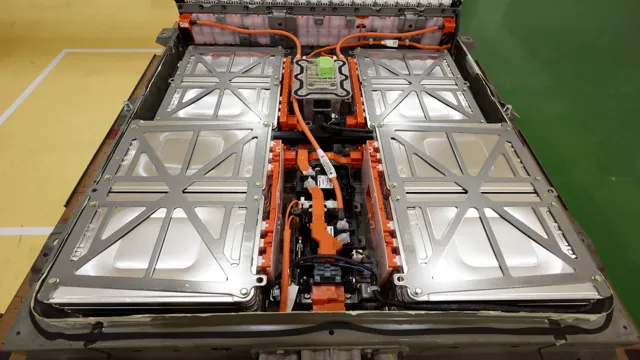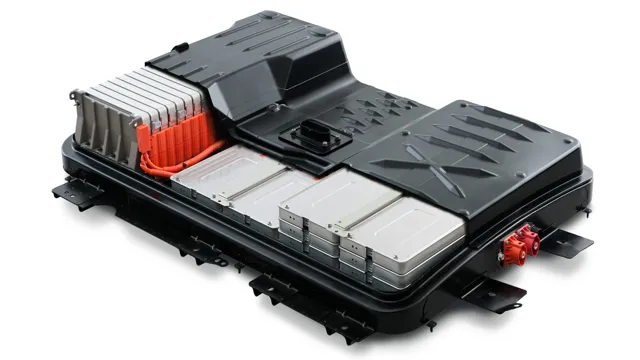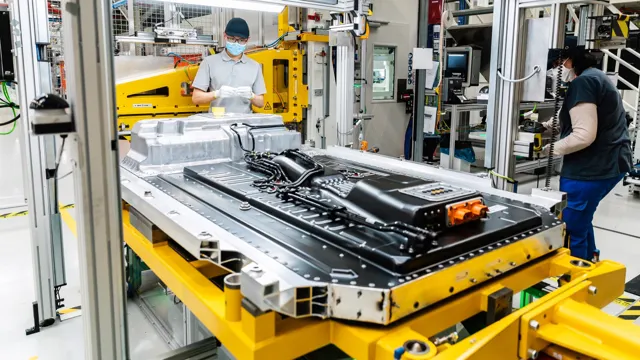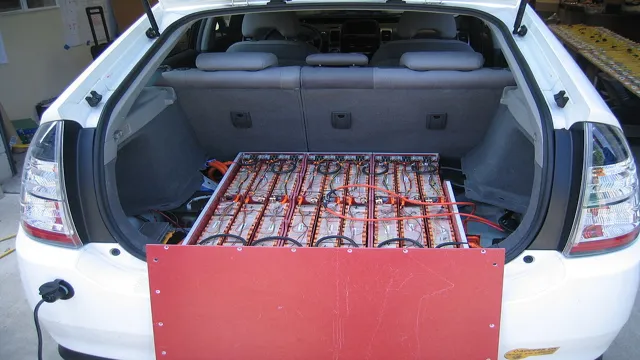Revving Up for the Future: Exploring the Latest Electric Car Battery Developments in 2019
Electric cars have been gaining in popularity over the years, with more and more people opting for this eco-friendly mode of transport. One of the main concerns that many of us have about electric cars is the battery life. However, 2019 has brought with it some major innovations and improvements in electric car battery technology.
In this article, we’ll explore some of the latest developments that are making electric cars an even more viable option for environmentally conscious drivers. From performance to cost, we’ll cover everything you need to know about the latest electric car battery news of 201 So sit tight and let’s dive in!
Top Battery Innovations
If you’ve been keeping up with the electric vehicle world, you know that battery technology is constantly advancing. In 2019, some of the top battery innovations were the introduction of solid-state batteries, advancements in lithium-sulfur batteries, and the development of new electrode materials. Solid-state batteries have the potential to offer higher energy density and better safety compared to traditional lithium-ion batteries.
Several companies, including Toyota and BMW, have already invested in this technology. Lithium-sulfur batteries are also gaining attention due to their higher energy density, longer lifespan and ability to recharge more quickly. And research into new electrode materials, such as silicon or titanium, is leading to batteries that can store more energy at a lower cost.
With these developments, electric cars are becoming more practical and affordable for the average consumer. It’s an exciting time for those interested in clean energy solutions, and we can’t wait to see what the future holds for electric car battery technology.
Tesla’s New Battery Technology
Tesla’s new battery technology has been generating a lot of buzz lately. The company claims that their newly developed battery is capable of providing up to 10% more power and lasting up to 16% longer than their previous models. The key to this innovation lies in the use of silicon anodes instead of the traditional graphite anodes.
Silicon has a much higher energy density than graphite, which allows for more energy to be stored in the same amount of space. This breakthrough could mean big things for the electric car industry, which has long been limited by the limitations of battery technology. With Tesla leading the charge, we could see a new generation of electric vehicles capable of longer ranges and faster charging times.
The potential for this new technology is incredibly exciting, and it could be the key to finally making electric vehicles a more viable option for everyday consumers.

Solid-State Battery Breakthroughs
Solid-state battery technology is advancing at an astonishing rate, revolutionizing the world of energy storage. One of the most significant innovations is the use of solid-state electrolytes, which eliminate the flammable liquid electrolytes found in conventional lithium-ion batteries. This not only improves safety but also increases energy density and allows for faster charging times.
Another breakthrough is the use of lithium metal anodes, which can store significantly more lithium ions than graphite anodes used in traditional batteries. Researchers have also found ways to stabilize the lithium metal to prevent dendrite growth, which can lead to short-circuits and battery failure. These advancements hold the promise of powering everything from electric vehicles to medical implants and are set to drive immense growth in the renewable energy sector.
Industry Update
Electric car battery news in 2019 is heating up, with major advancements and innovations being announced. In June of this year, Chinese car maker BYD unveiled a blade battery design, claiming to have solved overheating issues that have plagued the electric car industry. The new design offers increased safety, as well as higher energy density, allowing for longer driving ranges.
Additionally, Tesla announced plans to open a new factory dedicated solely to battery production, which would make them less reliant on outside suppliers and allow for faster innovation and development. These moves signal a strong push towards electric vehicles as the future of transportation, as manufacturers recognize the importance of battery technology in the industry’s growth and sustainability. Overall, 2019 has been a promising year for electric car battery advancements, with many more exciting developments in the works.
Growing Adoption of EVs
As electric vehicles (EVs) continue to gain popularity, the auto industry is faced with growing demand for these eco-friendly cars. Many automakers are investing heavily in EV technology and expanding their lineups with new models. Consumers are also increasingly drawn to the cost savings of EVs, which require less maintenance and offer lower fuel costs than traditional cars.
Additionally, the convenience of home charging and the reduced impact on the environment are driving more people to consider EVs as their next car purchase. As a result, EV sales have grown significantly in recent years and are expected to continue on this trajectory in the coming years. With the rise of EVs, the industry is experiencing a major shift towards sustainable transportation, and it’s exciting to see how this technology will shape the future of mobility.
New Battery Manufacturing Plants
In the dynamic world of technology, battery manufacturing remains at the forefront of innovation as companies continue to invest in the development of new, long-lasting, and efficient batteries. In recent news, it has been reported that several new battery manufacturing plants have either been built or are in the works. This is a promising development as the demand for batteries continues to rise, especially in the electric vehicle market.
With the growing need for sustainable energy, these plants will not only meet but also exceed expectations for high-quality batteries. The introduction of these plants comes as a result of increased investment in the renewable energy sector and it is hoped that their establishment will satisfy the markets in terms of supply and demand. Additionally, these plants will create job opportunities for people and ultimately boost the economy.
It is exciting to see these developments taking place in the industry, and we can’t wait to see what the future holds for the battery manufacturing sector!
Government Incentives and Policy Changes
The renewable energy industry is receiving a significant boost thanks to new government incentives and policy changes. Across the world, governments are implementing policies aimed at reducing carbon emissions and promoting clean energy sources, such as wind and solar power. In the United States, for example, the new administration has put forth a plan to invest heavily in clean energy infrastructure.
This includes creating a new agency dedicated to renewable energy research and development, as well as providing tax incentives to companies that invest in clean energy. Similarly, the European Union has set targets for reducing greenhouse gas emissions, and has implemented policies to promote the use of renewable energy sources. These policy changes have provided a significant boost to the renewable energy industry, and have led to increased investment in research and development, as well as the construction of new wind and solar plants.
As a result, the renewable energy industry is poised for significant growth in the coming years, providing new opportunities for investors and job seekers alike.
Future of Electric Car Batteries
Electric car battery news in 2019 has been optimistic and exciting. Researchers are constantly striving to improve battery efficiency, range, and charging times. One development to keep an eye on is solid-state batteries, which are expected to replace traditional lithium-ion batteries.
They are safer and more durable, while also offering much higher energy density. Another promising breakthrough is the use of sodium-ion batteries as a potential alternative to lithium-ion batteries, as sodium is more abundant and therefore more cost-effective. The future also holds the possibility of wireless charging technology, where batteries can be charged while in motion.
As electric vehicles become more mainstream, the importance of battery innovation cannot be overstated. The race to create superior electric car batteries is ongoing, and 2019 has shown that we are moving in the right direction.
Long-lasting Batteries on the Horizon
The future of electric car batteries is looking bright with the development of long-lasting batteries on the horizon. As the world moves towards more sustainable energy solutions, electric cars are becoming more popular than ever before. One of the biggest hurdles of electric cars has always been the range anxiety that comes with knowing that the battery might run out mid-journey.
However, with the development of new battery technologies, drivers will soon be able to travel longer distances without worrying about their battery life. Thanks to innovations in battery chemistry and engineering, future electric car batteries will be more efficient, lighter, and more capable of holding a charge for longer periods. Scientists and engineers are exploring a range of new materials, including lithium-air and solid-state batteries, which could potentially unlock even greater energy storage capabilities.
Additionally, advancements in battery management systems, charging technology, and vehicle design will all play a part in improving the driving range and overall performance of electric vehicles. Electric car manufacturers are already investing time and money into developing new and better battery technology. Tesla, for example, is building its own batteries at its Gigafactory, which will help the company reduce its reliance on third-party suppliers.
Other automakers are partnering with battery manufacturers like LG Chem to develop advanced batteries with improved safety and longer life spans. As the race towards more sustainable transportation continues, electric car batteries will play a crucial role in the industry’s success. With the development of long-lasting batteries, we can look forward to a future where electric vehicles are not only environmentally friendly, but also practical and reliable for everyday use.
Potential for Wireless Charging Technology
Wireless Charging Technology The future of electric car batteries is looking brighter with the advancements in wireless charging technology. This means that drivers can simply park their electric vehicles over a wireless charging pad and the battery will recharge automatically without the need for cables or power cords. While the technology is still in its developmental stages, early tests have shown promising results, and experts estimate that wireless charging pads could potentially increase the adoption rate of electric vehicles.
One of the advantages of wireless charging technology is that it eliminates the need for human interaction, which increases convenience and reduces the risk of accidents. This could lead to a future where electric vehicles are charged seamlessly and efficiently, without any disruption to drivers or passengers. As the technology continues to evolve, it is expected that wireless charging pads will become more affordable and widespread, making it easier for electric vehicle owners to maintain their batteries and reduce range anxiety.
In short, the future of electric car batteries looks bright with the potential of wireless charging technology.
Bottom Line and Takeaways
In 2019, there were exciting developments in the world of electric car batteries. With advancements in technology, electric cars are becoming more mainstream and accessible to the average consumer. One major development was the increase in driving range for many electric cars.
In fact, some newer models can go over 300 miles on a single charge, which is a huge leap forward from just a few years ago. Another important development was the faster charging times for electric car batteries. Some charging stations can now provide a charge in as little as 30 minutes, making it much easier for drivers to take long road trips.
Overall, electric car battery news in 2019 showed that this technology is becoming more efficient and effective, and it’s definitely something to keep an eye on as we move into the future.
Conclusion
It’s clear that electric car batteries are evolving at lightning speed, with advancements in technology and increased investment driving impressive improvements in range, charging times, and overall performance. While 2019 has been a particularly exciting year for the industry, with major players introducing new, more powerful models and innovative solutions to common obstacles, we can expect the upward trajectory to continue well into the next decade. Whether you’re a die-hard EV enthusiast or a curious skeptic, there’s no denying that the future of transportation is looking greener than ever thanks to electric car batteries.
“
FAQs
What are the latest advancements in electric car batteries for 2019?
The latest advancements in electric car batteries include longer range, faster charging times, and improved battery lifespan. Some companies are also experimenting with solid-state batteries.
How does cold weather affect the performance of an electric car battery?
Cold weather can affect the performance of an electric car battery by reducing its range and efficiency. This is because the battery has to work harder to maintain its temperature, which can drain the battery faster.
Are there any new electric car battery technologies on the horizon for 2019?
Yes, there are several new electric car battery technologies being developed for 2019. These include solid-state batteries, which offer improved performance and safety, and flow batteries, which can be recharged with an electrolyte solution.
What is the cost of replacing an electric car battery in 2019?
The cost of replacing an electric car battery in 2019 varies depending on the make and model of the car, as well as the battery’s capacity. On average, it can cost anywhere from $3,000 to $7,000 to replace an electric car battery. However, some manufacturers offer battery replacement programs that can reduce the cost.





